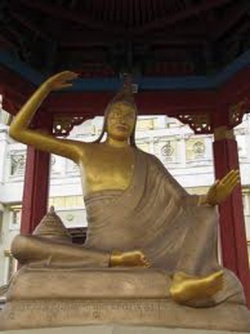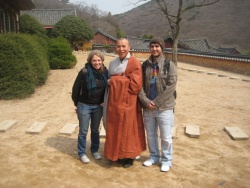Buddha Wisdom (Awareness, Selflessness, Inclusion)
There is a type of awareness that exists before anything else. It exists before any of our ideas and concepts, our emotions, biases, or ambitions, or even our self-definitions. In Buddhism, it is called naked awareness.
It is called naked because it is awareness without anything added onto it. It is said to be beyond concepts, but that can sometimes give the notion of being outside or apart from everything. The truth is that this naked awareness UNDERLIES everything else. It exists first and everything else comes afterwards. This is why we all posess it and have access to it.
This is the Wisdom that the Buddha Family has access to. I say "has access to" because ordinary Buddha Family members have a taste of it, but do not experience anywhere near the complete thing. Only through spiritual practices can we come even close to the complete experience of this naked awareness. When we experience it fully, it is known as All-Encompassing Wisdom. In many ways, it is like space. It contains everything and is part of everything.
Because this awareness starts at the very beginning, it can see the beginnings of everything with extreme clarity. It sees the beginnings of our attempts to divide, analyze, and organize the world. It sees the beginning of feelings and our grasping and clinging to them. It sees the very beginnings of our perceptions of the world around us. It sees our formation of ambitions and goals and how our thought, speech, and action arise from them. It sees the beginning of our limiting our sense of space, diminishing our awareness, and creating the borders between self and other.
It is like we're looking down on a hill of ants watching them scurry about, caught up in their individual struggles while we are looking on from a distance. This allows us to see the individual struggles within a larger picture. It allows us to see the whole ant hill, the lawn, and the area around it. This can also give us a feeling of empathy as we can see how it is possible to fall far away from this basic awareness and how easy it is to get caught up with, tormented by, and overwhelmed because of our problems.
So with this wisdom we can see the whole picture and put our individual actions into a larger perspective. This adds more meaning to what we're doing and shows up the difference between meaningful activity and non-meaningful activity. Once we recognize meaningful activity and can see where our actions fit the larger picture, we end up with a stronger sense of purpose. Achieving purpose creates a feeling of fulfillment and satisfaction.
So, with this awareness comes a sense of perspective, a sense of empathy with the struggles of others, and a sense of satisfaction and fulfillment. The sense that we then develop of our awareness containing and including everything in the universe adds to the feeling of wholeness, oneness and sameness.
Added to this wholeness and oneness is the realization that the universe is without a centre. This helps to give a sense of the vastness of the universe, the minuteness of our existence and our struggles, and how greatly all of our lives are intertwined. This increases our feeling of selflessness and this is why selflessness is always mentioned as an important part of spiritual practice. It most accurately reflects the real nature of reality.
At the same time as we experience this minuteness, we also notice how each being tends to focus on their own universe with themselves at the centre. If there are twenty people in a room, there are at least twenty world systems in that room. If we count the different systems of cells within our bodies, then there are even more world-systems operating at the same time and influencing each other.
Seeing this from the more expansive viewpoint of All-Encompassing Wisdom helps to eliminate the exaggerated hold that this self-centred tendency has on us. Once this focus is put in perspective, it also helps us to recognize the potential value of each individual being and each individual thought, speech, or action and its contribution to the whole picture.
The end result is a feeling of selflessness combined with a feeling of appreciation of every act and every event in the universe. Every thought is a reflection of the current state of the universe. Every feeling is our interaction with the rest of the cosmos. Every experience is a message and a teaching and a manifestation of basic awareness and potential energy operating within limitless space.
We end up experiencing the unity of this basic awareness, limitless space, and potential energy, combined with the manifestations of that energy. These manifestations include the movement of the stars and planets, the motions of the winds, and movements of the earth, as well as the thought, speech, and action of all sentient beings. It involves all the forms that exist, and includes all of the feelings and perceptions of everyone. It involves the interplay of the entire collection of the intentions of all beings, and includes all of the changing levels of awareness of everyone in the universe.
But this experience is ungraspable. As soon as we try to grab onto it, it vanishes into the manifestations of the world. If we attach ourselves to, or grasp at, or cling to any of the wordly manifestations, then our focus narrows and, again, we move away from that basic awareness and become involved in a form of existence that has the potential for suffering.
As we begin to realize this and as we become more familiar with this All-Encompassing Wisdom, we start to see more clearly how suffering is created and how one type of action leads to suffering results and a different type of action leads to the creation of peace and joy. The result of this understanding is that our overall skill in life increases more and more. It also reinforces our empathy and compassion for others.
So our goal then becomes to get to the point where we are able to experience the world, while maintaining our experience of that basic awareness at the same time. What prevents us from doing this is that we grasp for, become attached to, or identify with a portion or all of these wordly manifestations. We become overly involved in all of the sights, sounds, smells, tastes, touches, and ideas around us.
Being overwhelmed and caught up in these things, we quickly lose sight of the fact that all of the things in this world are ultimately ungraspable and do not last or remain unchanged. Attaching our minds to worldly phenomena pulls us away from the middle ground and then we lose sight of this basic awareness. Keeping ourselves in this middle ground is the ultimate meaning of the term "Middle Path".
Also, in order to experience the inclusiveness of the universe, we have to accept the existence of ALL aspects of the world around us, good or bad. This is why anger is the worst emotion, because it involves an attempt to reject a part of reality and create a fight between ourselves and some part of our world. It takes us farthest away from our basic essence and essential awareness which includes ALL of reality.
Next is fear, where we try to run away from a part of the world, which is like trying to run away from ourselves. Greed is the next negative emotion because it involves trying to be the sole owner of a part of the world and trying to deny the temporariness and interdependence of all relationships in reality.
Dullness, ignorance, and indifference are all ways in which we try to deny or ignore the existence of some aspects of our world.
Accepting even the negative aspects of the world may seem strange, but it's actually the only way that we can make improvements. In order to apply the correct cure for a disease, we have to identify and admit that a particular disease exists. It's like the alcoholic who has to first admit their alcoholism and admit that they need help to change it. It is also the purpose of confession. If we think we are doing nothing wrong then we won't change our behaviour.
Only once we admit that there is a problem and that we have made a mistake can we begin to make amends and fix the situation. It's the same with suffering. If we don't think that we're suffering, or we don't think that we can do anything for someone else's suffering, then we won't take the steps to eliminate it. If we don't look at our suffering and then look for the cause of our suffering and recognize it, then we will NEVER be able to eliminate our sufferings.
Recognizing that we need to acknowledge these negative aspects of our world leads to a sense of acceptance. If done well, it should lead to an acceptance of and patience with the faults of others as well. Our ability to work with these problems becomes a measure of our wisdom and spiritual skillfulness and these problems and difficult situations become the raw materials for improving our spiritual practice.
So we have to give up identifying with, clinging to, or trying to get lasting satisfaction from any object or mind-state that is transitory. At the same time, we can't try to ignore or deny the existence of this transitory world. Doing so is the same as clinging to empty space or trying to pretend that there is no world, or that the world doesn't affect us. If we relate to the world in any of these ways, we cause ourselves and others suffering. Either way, we have to get ourselves out of the habit of grasping at the ungraspable while still working within this ungraspable reality.
This becomes walking the middle path between emptiness and reality, without falling into attachment to either side. Maintaining perception of the emptiness or hollowness of reality, that comes from this naked awareness, while remaining involved with the manifestations of the world, is called complete view, or also Higher Wisdom. Acting based on the interconnection of all of reality within this emptiness is called Higher Conduct which includes all of the teachings concerning complete thought, speech, action, and livelihood that are part of the path to Buddhahood.
Maintaining the experience of both emptiness and interdependence at the same time requires complete concentration. This requires learning proper mindfulness, and developing the right type of effort. These three combined are part of what's called Higher Concentration. It is in this way that the eightfold path to Buddhahood is fulfilled in each moment. Therefore, we can look at our spiritual practice as our training in Higher Wisdom, Higher Conduct, and Higher Concentration. These trainings are called the three baskets of practice in Buddhism.
So, when Higher Wisdom, Higher Conduct, and Higher Concentration are all occuring in every moment of our lives then Buddhahood has been attained. Because the basic awareness, potential energy, and limitless space that creates these three baskets is our essential nature or underlying essence, then we all have the ability to have this experience.




